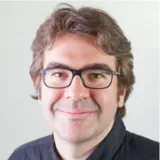Please note: this event has passed
Join Professor Xavier Trepat from ICREA @ Institute for Bioengineering of Catalonia for a Force Talk entitled 'Epithelial mechanobiology from the bottom up.'
Abstract:
Epithelial sheets form specialized 3D structures suited to their physiological roles, such as branched alveoli in the lungs, tubes in the kidney, and villi in the intestine. To generate and maintain these structures, epithelia must undergo complex 3D deformations across length and time scales. How epithelial shape arises from active stresses, viscoelasticity and luminal pressure remains poorly understood. I will present different approaches to study the mechanobiology of epithelial shape from the bottom up. I will discuss new technologies to design epithelia of arbitrary size and geometry and to subject them to controlled mechanical deformations in 3D. I will show that monolayers exhibit superelastic behavior when stretch is applied and that they readily buckle when tension is released. We use this phenomenology and a 3D vertex model to rationally direct spontaneous pattern formation, and hence engineer tissue folding. I will also present our recent advances to understand the mechanobiology of intestinal organoids. We map the three-dimensional cell-ECM and cell-cell forces in mouse intestinal organoids grown on soft hydrogels. We show that these organoids exhibit a non-monotonic stress distribution that defines mechanical and functional compartments. From these experiments we conclude that the stem cell compartment folds through apical constriction and that cells are pulled out of the crypt along a gradient of increasing tension, rather than pushed by a compressive stress downstream of mitotic pressure as previously assumed. This experimental and theoretical work unveils how patterned forces enable folding and collective migration in the intestinal crypt.
Speaker:
Xavier Trepat was trained in Physics and Engineering at the University of Barcelona. In 2004 he obtained his PhD from the Medical School at the University of Barcelona. He then joined the Program in Molecular and Integrative Physiological Sciences at Harvard University as a postdoctoral researcher. In January 2011 he became an ICREA Research Professor at the Institute for Bioengineering of Catalonia (IBEC). Trepat’s research aims to understand how cells and tissues grow, move, invade and regenerate in a variety of processes in health and disease. To achieve this, he has developed technologies to measure cellular properties at the micro- and nanoscales. He has then applied these technologies to identify fundamental mechanisms in cell biology and biophysics.
How to join:
This event will take place online via Microsoft Teams. To be notified of updates click 'Register for this event' or use the link to join the meeting.

